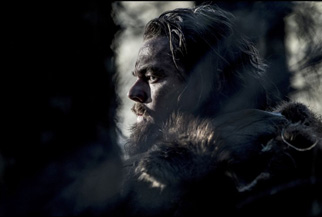The 400-Word Review: The Revenant
By Sean Collier
January 11, 2016
No widely released film this year — or next year, or last year, or most years — will look anything like The Revenant, the bizarre, moving Western epic from Alejandro G. Iñárritu. It will feel profoundly unfamiliar to some viewers, with long stretches without dialogue, lingering shots of the imposing landscape and brutal, jarring violence. But because of its overwhelming performances, its awed direction and its breathtaking photography, few will be able to deny the film’s brilliance.
Inspired by a true incident, The Revenant opens on a fur-trapping party in modern-day Montana. In 1823, that land was part of the still-recent Louisiana Purchase territory and only sparsely populated by Native American tribes thoroughly displeased with American visitors; to wit, the film opens with a harrowing attack by an Arikara tribe which sends the decimated party scurrying to their boats.
Hugh Glass (Leonardo DiCaprio) survives the skirmish, along with his mixed-race son, Hawk (Forrest Goodluck). After escaping, stoic captain Andrew Henry (Domhnall Gleeson) informs the group they’ll be burying the furs and heading back to a nearby outpost, much to the chagrin of John Fitzgerald (Tom Hardy), who is determined to profit from the expedition in spite of the attack. Fitzgerald is also highly suspicious of Hawk, who was born to a Native American mother.
Before the party can cover much ground, Glass is attacked and mauled by a grizzly bear. Barely alive, the decision is made to leave a few party members with Glass until he dies; at the chance to make a bonus, Fitzgerald volunteers for duty. Within days, though, Fitzgerald abandons Glass, assuming he’ll die in short order; Glass survives and begins crawling toward revenge.
If you didn’t know that The Revenant was made so soon after Iñarritu’s Oscar-winning Birdman, it might be evident from the director’s visual style. The long shots and dazed pans remain, though they take on a new tone; rather than scanning backstage drama, they survey destruction, violence and bleak, empty landscapes. The Revenant also shares Birdman’s focus on expression and reflection, even if the two films’ characters couldn’t be more different.
Further buoyed by Ryuichi Sakamoto’s disconcerting score, The Revenant would have a distinct tone if no lines of dialogue were ever spoken. But the most praiseworthy features of this remarkable film are the performances given by DiCaprio and Hardy, two of the world’s finest actors and the absolute height of their powers.
My Rating: 10/10
Sean Collier is the Associate Editor of Pittsburgh Magazine and a member of the Broadcast Film Critics Association. Read more from Sean at pittsburghmagazine.com/afterdark
|
|
|
|




